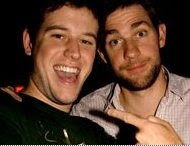 A new movement popping up against attacks on gays and lesbians? A timid campaign against an anti-gay proposition that refuses to show images of the people they are defending? A new politician offering hope and change?
A new movement popping up against attacks on gays and lesbians? A timid campaign against an anti-gay proposition that refuses to show images of the people they are defending? A new politician offering hope and change?No, that's not the news today, that's Milk, the new biopic about Harvey Milk starring Sean Penn. What an incredible biopic it is--not just taking on the issues that are relevant today but showing the pitfalls and challenges that people faced as they confronted homophobia. And Sean Penn simply is Harvey Milk--not since Malcolm X has a an actor so embodied a character like this both politically and dramatically.
The film starts with black & white documentary footage of men in a gay bar being arrested and crammed into a police van, presumably in the 1950s or 1960s. The humiliation is clear, with most hiding their faces and some lashing out at the camera, not to mention having their names published in the newspaper. But that's not just humiliation, that's a risk to their livelihoods, with the possibility of losing their jobs and in many cases their wives. Milk provides a stark reminder that at least as late as 25 years ago (and certainly even later) gay men could not walk the streets of San Francisco without some concern over their safety.
When we first see Milk, he is a closeted Republican businessman who moves to the Castro to setup a camera shop. San Francisco is supposed to be gay friendly, but he is "welcomed" by a fellow shop owner who shakes Harvey's hand, takes out a handkerchief to wipe off the gay, and tells him to get the hell out of there. Milk's struggle for mere acceptance of himself and others leads him to a series of campaigns for public office. All fail until the elections are altered so that San Francisco residents elect the Board of Supervisors by neighborhood--and it just turns out that Harvey's district consists largely of the Castro and the Haight. "All we have to do is convince the gays and the hippies," his advisor tells him.
But Milk is not a preachy movie about "big issues" (not that there is anything wrong with that), nor is it a campaign story of backroom deals (though Milk comes off quite well in his private conversations with various power-brokers). Rather, it is a view into the lives of a group of people--Harvey Milk and his friends and supporters--at a very specific time and place. They transformed the world that they lived in and were in turned transformed by their experiences.
 They lived through the transformation of San Francisco and the Castro into the country's gay mecca. It did not happen automatically--demographic changes certainly opened up new opportunities for political change, but each step forward had to be strategized and carried out with real risks of backlash and genuine personal strains on the individuals--and their loved ones--involved in these events. This is the center of the drama in Milk. It is not so much that the personal is political--it's that you cannot struggle for change without being effected by the outcome.
They lived through the transformation of San Francisco and the Castro into the country's gay mecca. It did not happen automatically--demographic changes certainly opened up new opportunities for political change, but each step forward had to be strategized and carried out with real risks of backlash and genuine personal strains on the individuals--and their loved ones--involved in these events. This is the center of the drama in Milk. It is not so much that the personal is political--it's that you cannot struggle for change without being effected by the outcome.This is a fascinating story in its own right, but it is elevated a step higher by the incredible performances. First and foremost is Sean Penn. It is almost difficult to describe him as "Sean Penn" because you do not ever for a moment think of him as Sean Penn, the person or the actor. Every gesture, every lewd comment, every impassioned speech seems so genuine it is hard to see any performance at all.
The supporting actors should not be forgotten either. James Franco as Harvey's lover is the friend who loves him and his cause, but as a supporter and not a leader. He is affectionate and loving, but not infinitely patient. It is easy to take the long view watching the movie and wonder why he could not be more patient and understanding, but Franco's character provides a more honest portrayal than the romanticized ideal we might have of a great leader's loved ones. Emile Hersch is also a standout--based on a real person I had never heard of, Hersch finds a way to portray a character that we feel like we know as soon as we meet him.
Nor should we forget, of course, Josh Brolin as Dan White. Between Milk and W., Brolin would be more eligible than anybody this year to be nominated for "Best Actor in the Role of a Right-Wing Asshole," and I am sure would have a lock on winning.
Go see Milk--enjoy it as a movie and as a reminder of how dramatic, exciting, and painful turbulent times can be.





1 comment:
I guess I'm the only person in America that did not like it that much. I thought it was good but not great.
Also, I did not think Sean Penn was that great as Harvey Milk. The awful hair and the high pitched whiny voice is just grating and annoying. Also, I'm not sure he's convincing as a homosexual.
The real Harvey Milk was younger, handsomer and sexier than Penn as Milk. He was also much more natural as himself.
Post a Comment